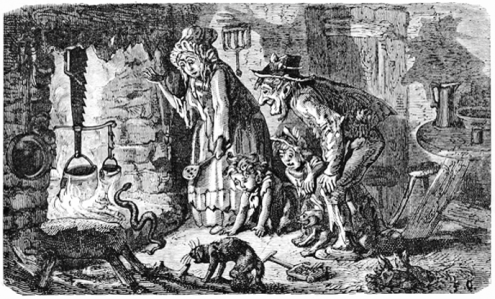Who is to blame?
The farmer and the viper:

Image by Ernst Griset, 1874
A Farmer walked through his field one cold winter morning. On the ground lay a Snake, stiff and frozen with the cold. The Farmer knew how deadly the Snake could be, and yet he picked it up and put it in his bosom to warm it back to life.
The Snake soon revived, and when it had enough strength, bit the man who had been so kind to it. The bite was deadly and the Farmer felt that he must die. As he drew his last breath, he said to those standing around: Learn from my fate not to take pity on a scoundrel.
~Aesop’s Fable
A Riddle for Modern Times
Fables are interesting. We can learn a great deal about ourselves from our interpretation of them. This particular tale—one of Aesop’s Fables—has appeared in many forms throughout history. The many shifts in the telling often lead to different types of conclusions. For instance, the Griset illustration above actually parallels a slightly different story from the version listed above. As in the illustration, in an alternate version, the farmer takes the snake home and warms it by the fire. In each varied telling, the frame of the story tints the moral.
Consider the two most crucial elements regardless of moral variation. First, the farmer, with full knowledge of the snake’s nature, takes the snake “in” (tucked into his shirt, into his home, etc.). Second, the snake, acting fully within its nature, attacks and ultimately kills the man. The question is this: Where does the fault lie? Who is to blame for the death of the farmer?
Consider the current political dynamic in the United States. Who is the viper? When searching for an analog to the snake in our various current event scenarios, for some, the 45th president comes to mind. Others think of immigrants. Still others think of elected officials or banks and corporations in whom we place so much faith and dependence.
Perhaps more important than the snake, the farmer is the primary actor. The farmer makes a choice, or so it appears. In any case, the farmer, through a chosen action, instigates a result. Who is the farmer? Protagonist, perpetrator or victim—who is to say? Perhaps the farmer, like the snake, merely acts within his own nature. But perhaps the farmer chooses to act rather than react. Perhaps the farmer, like Sisyphus, makes a choice despite the seemingly negative (or futile) outcome. He chooses because that is what he does. Perhaps the choice, not because of its nature but by virtue of its existence, is who he is. In the end, the farmer dies. The question remains.
Who is to blame?
